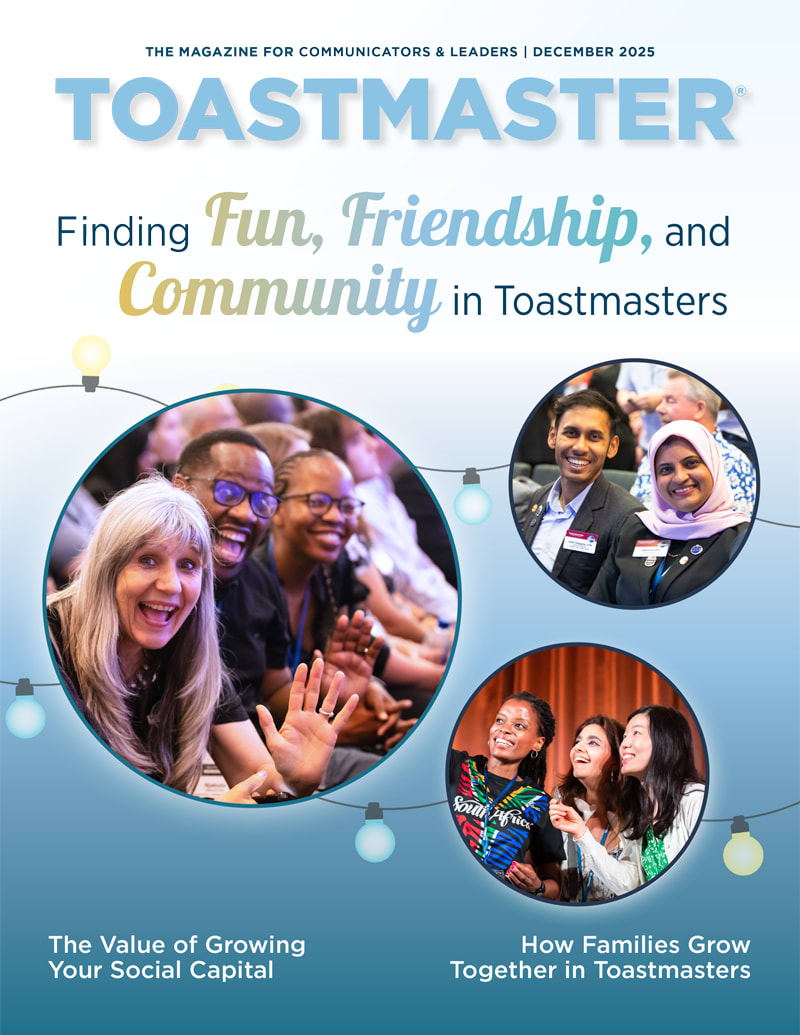After his 1973 release as a U.S. prisoner of war in North Vietnam, Laird Guttersen remained deeply involved with Toastmasters until the final years of his life. The longtime Tucson, Arizona, resident, who helped organize a secret Toastmasters club in the infamous Hanoi Hilton, was a member of several clubs. He earned a DTM, competed in speech contests, served as a contest judge and attended district conferences.
Guttersen was a member of the Northwest Casas Adobes club in Tucson from 1990—when the club started—to 2005.
He died the following year, at 80.
Judith Norris, DTM, was a fellow member in Northwest Casas Adobes for many years. She still has a vivid mental picture of Guttersen delivering his speeches.
“He was very eloquent, and he was—because of his manner and his military presence and his way of handling himself, physically even—very impressive,” Norris says of the retired Air Force colonel.
“With what he had to say and how he went about saying it,” she adds, “he was someone you always wanted to listen to.”
Guttersen’s Toastmasters experience served him well. He gave speeches to local and U.S. audiences about his experiences as an American POW, and he was an outspoken advocate for military families whose loved ones were prisoners of war or missing in action. Guttersen gave frequent media interviews as well. He also ran for political office, losing a 1976 bid for the U.S. House of Representatives.
In their Toastmasters club, Guttersen rarely spoke about his war experiences, says Norris. But she does remember one club meeting when he did. The club president at the time had asked him to speak about his time as a POW. Specifically, says Norris, he wanted Guttersen to explain “how you deal with that kind of pain and agony, and to answer the question of how people manage to get through something so unbelievably horrible and still come out the other end.”
The club president set aside the entire meeting for Guttersen’s speech. As Norris remembers it, the former fighter pilot spoke, without notes, for the better part of an hour. He talked about the torture he endured but also about how, ultimately, he had to mentally forgive his captors in order to survive the psychological trauma.
“It was very, very powerful,” says Norris, still a member of the Northwest Casas Adobes club. “As you can tell, it’s something I have never forgotten.”
Charter Membership
Less than six months after Guttersen’s release in 1973, the Hanoi Hilton Toastmasters received a charter membership from Toastmasters International. In 1986, Toastmasters presented a copy of that charter to Col. Ben Pollard, who had participated in the Hanoi Hilton club as a POW. John Stark, DTM, the District 5 governor at the time, and Herb Nowlin, DTM, then a member of Toastmasters’ Board of Directors, gave it to Pollard at a District 5 Conference. Both Stark and Nowlin are Vietnam War veterans.
“Colonel Pollard was visibly moved by the surprise charter presentation and so was his wife Joan,” recalls Stark, who also awarded Pollard the district’s Communication and Leadership Award.
Nowlin, a longtime Toastmaster, was a reconnaissance pilot in the war. He says the Hanoi Hilton club is a dramatic testament to the power of Toastmasters even in its most primitive form. “Toastmasters was an important function in their lives. They went to a lot of trouble to do it—if they got caught, they got tortured.”
Norris, too, says she’s amazed and inspired by how POWs like Laird Guttersen created a Toastmasters club in the darkest of places—and drew comfort from it.
Eileen Hope, DTM, a past District 5 governor, contributed to this article.
Paul Sterman is senior editor, executive and editorial content, for Toastmasters International. Reach him at psterman@toastmasters.org.


